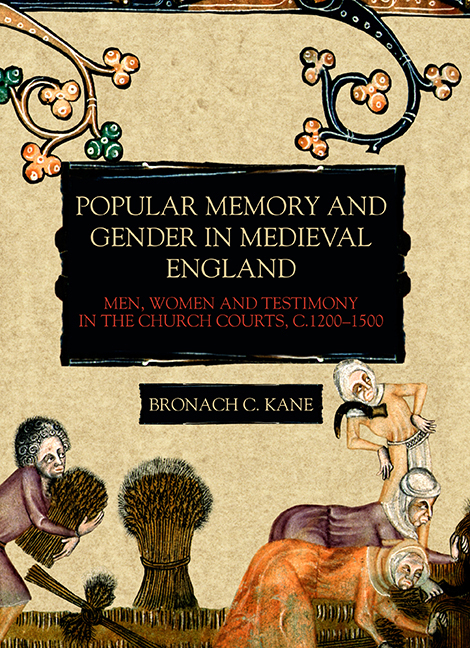 Popular Memory and Gender in Medieval England
Popular Memory and Gender in Medieval England Published online by Cambridge University Press: 03 September 2019
In 1269, Alice de Mordon testified on the birth of Cecilia, daughter of Bartholomew of Scuynewell, twelve years earlier in the village of Ashwell in Hertfordshire. Alice told the court that she remembered when Cecilia was born ‘because she was her wet nurse, and nursed her for two years’, and her own son had been born in the same year. Initiated in the archdeaconry of Huntingdon, the suit concentrated on Cecilia's age at marriage, which her family claimed had fallen short of the legal requirement of twelve for girls, hence fitting the impediment of nonage. Other women in the same case also based their testimony on memories of childbirth and nurture. One Matilda de Hinteworth recalled that she had travelled late in her pregnancy to give birth in the village of Ashwell, where Cecilia's mother brought her alms during her time in child-bed. Similar in function to men's evidence in proof-of-age inquests, testimony of this kind instead foregrounds women's memories of birth and highlights their ability to navigate both social norms and legal expectations.
Pregnancy and childbirth were common motifs in women's narratives and, as evidence like Alice's suggests, birth and early maternity offered a set of recognisable rhythms by which the past could be described. Current interpretations of the relationship between gender and memory, however, flatten the complexities of men and women's engagement with corporeal and reproductive memory. Existing works associate memories of childbirth with women in particular, characterising female remembrance as attuned to the reproductive life cycle and the home. Several studies explore male experiences of the birth-chamber and acknowledge the extent to which women's memories informed men's evidence in legal fora where female testimony was prohibited. A narrow focus on birth alone, as well as the slant of such sources, nevertheless reinforces gendered assumptions that align men's memories with the ‘public’ sphere and women's with the domestic. By addressing memories of sexuality and generation more squarely, the complex ways in which gender intersected with embodiment emerge in greater detail. The use of a broader framework also contributes to a more detailed understanding of the patriarchal and often judicial power structures that shaped legal encounters related to sex and generation.
To save this book to your Kindle, first ensure [email protected] is added to your Approved Personal Document E-mail List under your Personal Document Settings on the Manage Your Content and Devices page of your Amazon account. Then enter the ‘name’ part of your Kindle email address below. Find out more about saving to your Kindle.
Note you can select to save to either the @free.kindle.com or @kindle.com variations. ‘@free.kindle.com’ emails are free but can only be saved to your device when it is connected to wi-fi. ‘@kindle.com’ emails can be delivered even when you are not connected to wi-fi, but note that service fees apply.
Find out more about the Kindle Personal Document Service.
To save content items to your account, please confirm that you agree to abide by our usage policies. If this is the first time you use this feature, you will be asked to authorise Cambridge Core to connect with your account. Find out more about saving content to Dropbox.
To save content items to your account, please confirm that you agree to abide by our usage policies. If this is the first time you use this feature, you will be asked to authorise Cambridge Core to connect with your account. Find out more about saving content to Google Drive.